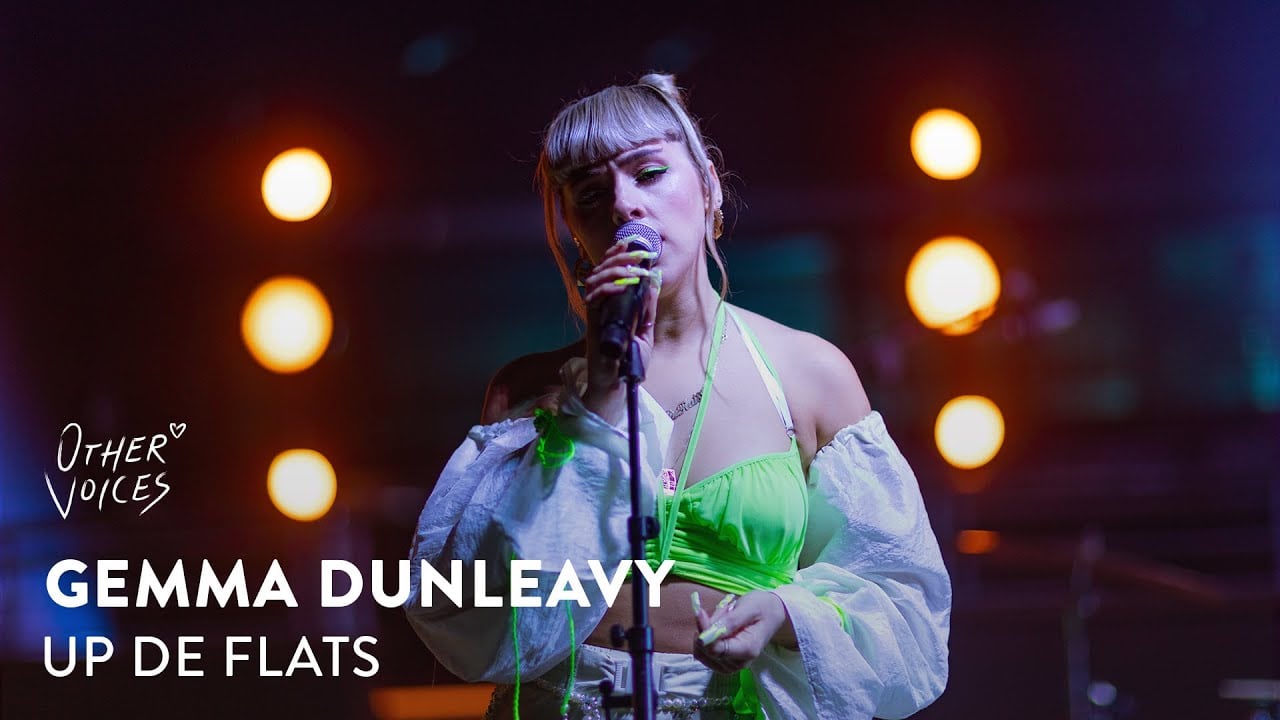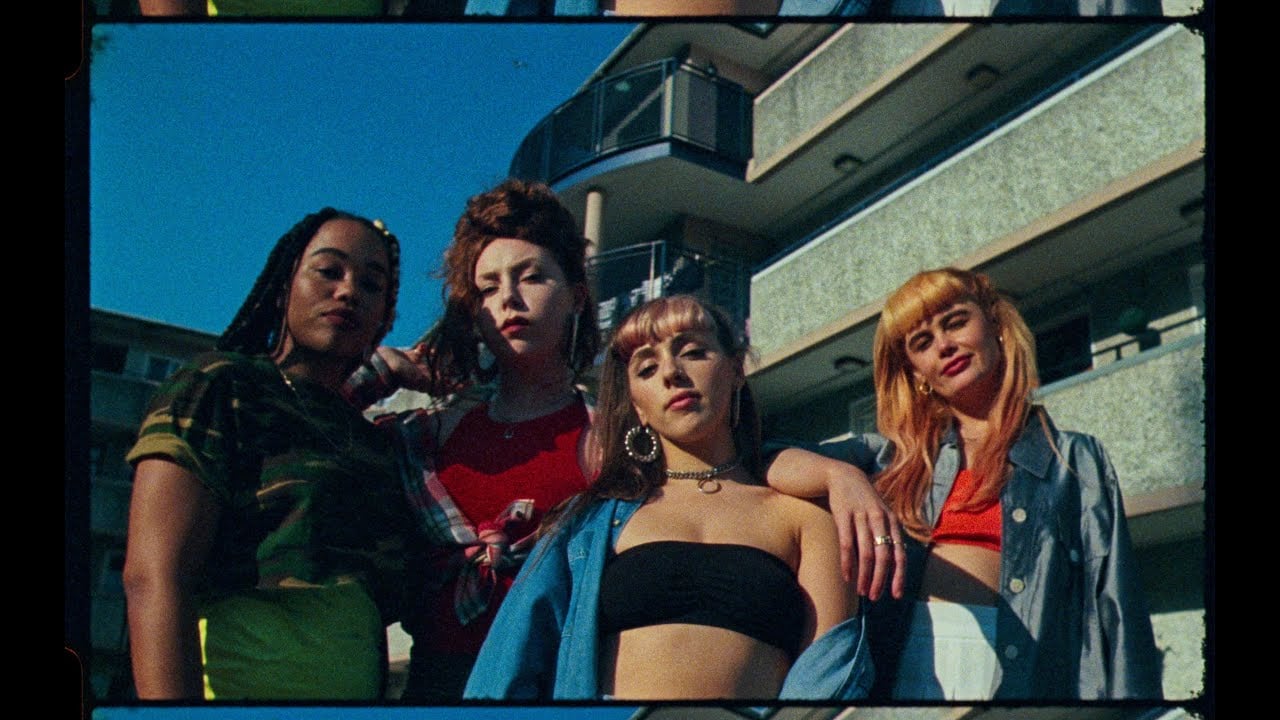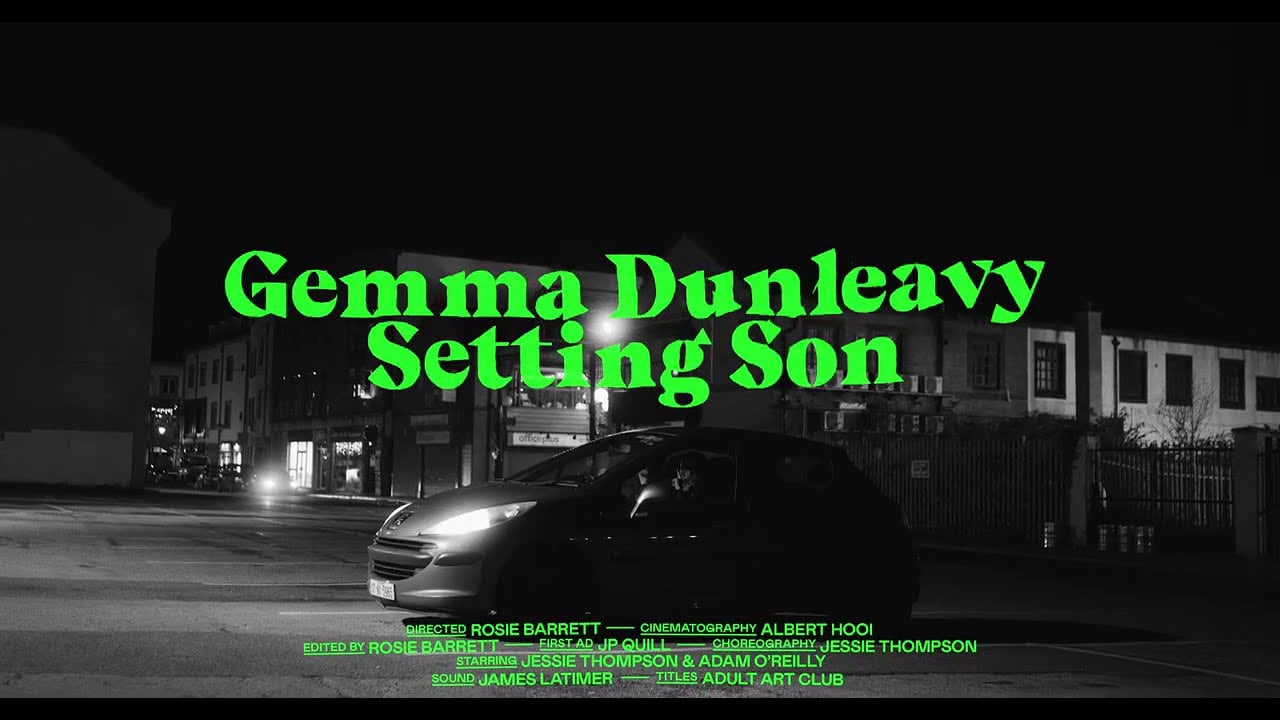Gemma Dunleavy may have had a breakthrough with ‘Up De Flats’ in 2020 and the subsequent EP release, but the inner city Dublin vocalist has been a mainstay of the city’s music scene since 2012, with her voice heard on dance records from the likes of White Collar Boy, CLU locally and Murlo and Swing Ting in the UK.
That debut EP, and Gemma’s subsequent live shows have shouted out the flats and Sheriff Street inner city community that raised her, with costuming by her mother, and active engagement in highlighting injustice and inequality on her doorstep.
Now, as Dunleavy prepares to perform a show at the Hennessy Hip Hop House at this year’s Body & Soul Festival, the singer reflects on her journey so far, and talks about what’s exciting her about what comes next…

Niall: So Gemma, what have you been up to lately?
Gemma: I’ve been writing and recording so much stuff solidly, since around September, October. It’s like a long form project that I’m trying to kind of put a shape on at the moment. I’m also working on the soundtrack for a play, so have been in that, too.
And then just kind of working the shorter term stuff – I’ve been working towards live gigs. And I suppose because I haven’t got a plan to release music in the next few months, there’s an exciting pocket that I found with working on music for live shows.
There’s only one place, one moment, one time, and you know exactly you have control of how it’s going to be, how people experience it.
So some of the music I’ve been working on with that intention, and then it can change into whatever it needs to be for a release. That’s been another little kind of side project – making music for shows.
So does doing live gigs kind of shape the music then itself after?
Yeah, it totally reshapes it for me anyway. I’d been working on loads of music all through last summer. It’s kind of like a conceptual project I was working on and I wasn’t really thinking about the output of the sound that was secondary to the bigger kind of idea of the project.
And then I played a few festivals last year and I can’t ignore the feeling of being on stage, and the feeling that the people felt that were there.
I’m not very celebratory person, in terms of putting celebration directly into my music. I’m quite a typical inner city Dub with quite dark humour and if you put things down on paper they sound quite negative but how they come across they’re actually not at all, you know what I mean?
And so I don’t actively try to put that in the music at all. And after the festivals last year I was like ‘I really need to try and hone this and capture it in what I’m recording’. That’s part of the little road I’m on now, I suppose, which wouldn’t have happened without live shows. It totally reshapes it.
“And some of it was like a moment of a real dancefloor hook, if you can say that? Now I have all these little I’m calling them ‘scraps’ because they’re all scraps of music that I really love. And one of them might be like a 22 second tune that can be made into a deadly song, but I don’t know if I want to do that with it for the sake of it.”
So in terms of the new stuff that you’re working on, what kind of inspirations are we talking in terms of your sound for it?
Right now, the obsession at the moment is kind of like losing space and time within music.
So while I’m saying I was really inspired by the four-to-the-floor type of stuff, there’s also some really melty stuff that doesn’t feel like it should exist with four-to-the-floor. And that really excites me.
That’s something that I’m like, ‘okay, I won’t get bored of this’, If this feels like something that I have to work to fit in or it feels like something that I can’t easily place within the “music industry”, quote unquote, that keeps me going.
Yeah. So can you give me an example of what that kind of meltiness is?
Stuff that is void of a time signature. There’s a lot of stuff that we just played, like, we improvised and we just played it. Not everything has a beat, if you know what I mean.
Making stuff that you kind of have to work to fit together, instead of being like building blocks.
I’m quite scatty, I’m all over place. I lose everything. And if someone gives me a piece of furniture that’s really easy to build, I will build the most complicated way. I’ll get to the end of it, but I’ll build it the most complicated way. Right?
And I’ve always been like that. And me ma is a dressmaker, and the way she sews is exactly like that. She doesn’t do anything the way you’d be taught off a pattern or anything like that.
Everything that she does is all bit by bit, the most amazing, intricate, detailed work she will do. But it’s all just pieced together. And I know another dressmaker will look at her and be like, you are giving me a headache, how are you doing this?
And the way that I’ve been working on this project, it ended up a little bit like that where I went away for a month in September and we just kind of like I had a few friends in and out, and we just recorded and recorded, and some of the stuff might have been like a two hour soundscape of just loads of different sounds with no beat.
And some of it was like, a moment of a real dancefloor hook, if you can say that? Now I have all these – I’m calling them ‘scraps’ – because they’re all scraps of music that I really love. And one of them might be like a 22 second tune that can be made into a deadly song, but I don’t know if I want to do that with it for the sake of it.
OK, so when I say melty, it means all the moments in between, the ones that I can make sense of.
A good example is Burial, like making tunes not on a grid. And then it being really interesting because of that. And people might not be able to point to why that is interesting without knowing that fact. But there is something inherently interesting in the idea that it’s not set to a robotic grid or a metronome, you know what I mean?
Yeah, I suppose as a vocalist, you understand music very differently to an instrumentalist. And sometimes that can feel like a bit hindered. I studied music and I know composition and stuff like that from studying, but when your fluent instrument is your voice, you go off feeling what note you’re playing.
Which is great in some ways, but in other ways, it makes you feel a bit blind to the stuff that doesn’t come naturally to you right? So I find it so interesting to dig deep into those things and try to understand them.
Yeah, it’s kind of like a bit jazzy in that way. You’re like improvving a bit…
Absolutely. It’s been, like a total jazz approach to music. Yeah, it’s been real refreshing.

So you’re playing at Hennessy Hip-Hop House at Body&Soul Festival, how does hip-hop and rap fit into your musical influences?
Hip-hop is a huge influence for me. I feel like most of my songwriting is inspired by, like old hip-hop and old rap music, like grown up around me cousins, listening to Biggie and Tupac.
And I remember first hearing, Tupac songs when I was younger and being obsessed with the stories in them. And I sound very relatable as well, just because inner city Dublin life, especially back then, was very relatable to what was on the records.
So for me, I draw mostly inspiration from writing from hip-hop and rap music, be it like the R&B/hip-hop side for melodies and stuff. And then but also for songwriting, you know, and still even now, you know, like, even when I did five weeks of writing, I made a playlist that was just, like, to set the mood or the tone for anybody that was coming in and out of the house.
And there was a lot of rap music, mostly old rap.
I feel like my song ‘Stop The Lights’, the energy from that was highly, like, the only energy that I could really liken that too, or mirror that too when I’m performing it, is like rap music.
My music probably wouldn’t exist without hip hop music.
And if you look at where hip-hop music and the communities that it was influenced from, and if you look at inner city communities and where my music is influenced from, they’re kind of like facing a lot of the same kind of neglect.
And I know there’s a whole other level, I’m not comparing race when I say that, but I’m talking about the projects compared to places like Dolphin’s Barn or Sheriff Street or whatever years ago, you know what I mean?
So I feel like there’s the same level of understanding between anybody that grows up in economic backgrounds like that.
And as, you know, like, you’ve got a community there [in Sheriff Street] behind you as well, which you’ve always been very good at bringing visibility to, which is so important.
Yeah, and I’m so blessed with them. Like, that’s why every time I pass by someone on the street, it’s like ‘how are you getting on with the music? When are you doing something else? When’s your next gig?’
And I’m like, ‘fuck, I need to finish stuff!’ I get enveloped in me, like, conceptual bubble for like six months and It’ll feel like a week to me.
And then, I’m like, oh, shit, I need to put foot on the gas! But, it’s great to have that time, and that support.
Gemma Dunleavy is playing the Hennessy Hip-Hop House at Body&Soul Festival this June.


Niall Byrne is the founder of the most-influential Irish music site Nialler9, where he has been writing about music since 2005 . He is the co-host of the Nialler9 Podcast and has written for the Irish Times, Irish Independent, Cara Magazine, Sunday Times, Totally Dublin, Red Bull and more. Niall is a DJ, founder of Lumo Club, club promoter, event curator and producer of gigs, listening parties & events in Dublin.














